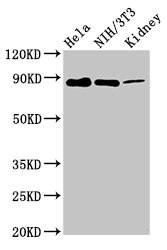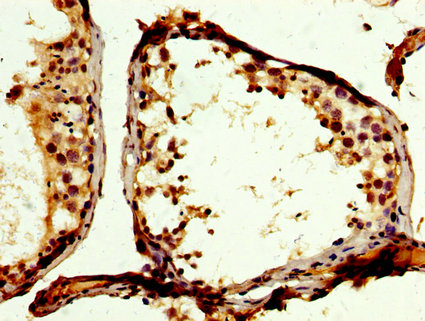Full Product Name
Rabbit anti-Homo sapiens (Human) PTPN12 Polyclonal antibody
Alternative Names
Protein tyrosine phosphatase G1 antibody; Protein tyrosine phosphatase non receptor type 12 antibody; Protein-tyrosine phosphatase G1 antibody; PTN12_HUMAN antibody; PTP PEST antibody; PTP-PEST antibody; PTPG1 antibody; Ptpn12 antibody; Tyrosine protein phosphatase non receptor type 12 antibody; Tyrosine-protein phosphatase non-receptor type 12 antibody
Species Reactivity
Human, Mouse, Rat
Immunogen
Recombinant Human Tyrosine-protein phosphatase non-receptor type 12 protein (539-714AA)
Immunogen Species
Homo sapiens (Human)
Conjugate
Non-conjugated
The PTPN12 Antibody (Product code: CSB-PA019026LA01HU) is Non-conjugated. For PTPN12 Antibody with conjugates, please check the following table.
Available Conjugates
| Conjugate |
Product Code |
Product Name |
Application |
| HRP |
CSB-PA019026LB01HU |
PTPN12 Antibody, HRP conjugated |
ELISA |
| FITC |
CSB-PA019026LC01HU |
PTPN12 Antibody, FITC conjugated |
|
| Biotin |
CSB-PA019026LD01HU |
PTPN12 Antibody, Biotin conjugated |
ELISA |
Purification Method
>95%, Protein G purified
Concentration
It differs from different batches. Please contact us to confirm it.
Buffer
Preservative: 0.03% Proclin 300
Constituents: 50% Glycerol, 0.01M PBS, pH 7.4
Tested Applications
ELISA, WB, IHC
Recommended Dilution
| Application |
Recommended Dilution |
| WB |
1:500-1:5000 |
| IHC |
1:200-1:500 |
Storage
Upon receipt, store at -20°C or -80°C. Avoid repeated freeze.
Lead Time
Basically, we can dispatch the products out in 1-3 working days after receiving your orders. Delivery time maybe differs from different purchasing way or location, please kindly consult your local distributors for specific delivery time.
Usage
For Research Use Only. Not for use in diagnostic or therapeutic procedures.








